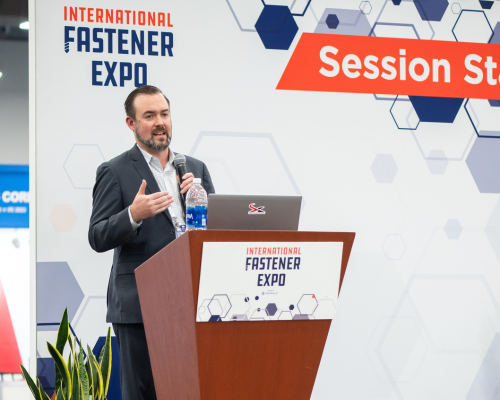Adam Pratt, President of Sherex Fastening Solutions, presented attendees with a case study at IFE 2023 that looked at an automotive tier in Michigan who was facing problems on the assembly line with round body rivet nuts spinning out in its frames. Sherex had a solution, but would the tier embrace it after the current solution wasn’t holding up? You can see Adam’s entire presentation on IFE Replay.

In this blog post we break down the basics of rivet nuts, how they work, the performance testing, and the technological advances of these fasteners.
Rivet nuts, also known as blind rivet nuts, threaded inserts, or nut-serts, are fasteners used to create a threaded connection in materials where it may be difficult or impractical to use traditional nuts and bolts.
Rivet nuts come in various materials such as steel, aluminum, and stainless steel, catering to different strength and corrosion resistance requirements. They also come in different thread sizes and styles to match the specific needs of a particular application.
These fasteners find application in a variety of industries, including automotive, aerospace, electronics, and general manufacturing. They are often used when it’s not feasible to access both sides of a material for attaching a nut and bolt, making them a convenient solution for a range of assembly tasks.
Rivet nuts are installed by compressing them against a work surface using a specialized tool. This tool deforms the rivet nut, causing it to expand and grip the material. Once installed, rivet nuts provide a threaded hole that can be used to attach a bolt or screw. This allows for the creation of a strong, reliable connection in materials like metal, plastic, or composites.
Performance testing of rivet nuts involves evaluating their functional characteristics, mechanical properties, and reliability under various conditions to ensure they meet the specified requirements for a particular application. The goal is to assess the performance and durability of the rivet nuts in real-world situations. Two tests to validate the application of a rivet nut are:
- Pullout Resistance Testing: Pullout resistance testing assesses the ability of the rivet nut to remain securely anchored in the material when subjected to axial forces. This is especially important in applications where the rivet nut is used in softer materials like plastic or composites.
- Spin Out Testing: Performance testing for spin out in rivet nuts involves evaluating the resistance of the rivet nut to rotation during the installation process. This can be a concern as it may lead to improper installation and compromise the integrity of the joint. The goal of spin out rivet nut performance testing is to ensure that the rivet nuts remain securely in place during installation, providing a reliable and stable threaded connection. This is especially important in applications where vibration, dynamic loads, or other external forces could potentially cause the rivet nut to rotate.
A variety of different technological advances have been applied to rivet nuts including material innovations, smart fastening technologies, and customization and 3D printing. Let’s take a look at each of these:
Material Innovations: Advancements in materials science may lead to the development of new alloys or composite materials for rivet nuts. These materials could offer improved strength, corrosion resistance, and durability, expanding the range of applications for rivet nuts.
Smart Fastening Technologies: The integration of sensors and smart technologies into fasteners is a broader trend. Smart rivet nuts may include features such as built-in sensors to monitor tension, torque, or temperature during installation. This could enhance quality control and ensure optimal performance.
Customization and 3D Printing: The use of 3D printing in manufacturing allows for the creation of complex and customized designs. This technology may enable the production of specialized or custom-shaped rivet nuts tailored to specific applications.
Learn more about rivet nuts in the case study presented by Sherex Fastening Solutions on IFE Replay, and save the date for IFE 2024, September 9-11 at Mandalay Bay in Las Vegas!








